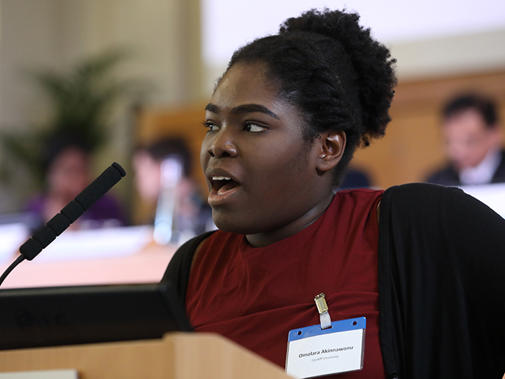The theme for this Black History Month ‘Proud to be’ truly resonates with me as it’s an opportunity to celebrate our culture and heritage, to acknowledge that our experiences of racism and discrimination do not define us and that we take pride in our achievements and accolades as they pave the path for future generations.
As I step into a new season of challenges through leadership roles, it’s important not to allow imposter syndrome to creep in. It can easily harm your self-belief and confidence in your capabilities.
Like many medical students, this is something I battled against particularly coming from a widening participation background. However, this month I am reminded of incredible black women who have exceled despite covert and institutionalised racism.
Black women who inspire me include Betty Campbell, Wales’s first black history teacher, who was proud to be black and a woman in an education and leadership role.
Lilian Bader, a Liverpudlian who became one of the first women to qualify as an RAF instrument repairer.
Annie Brewster one of the first African Caribbean nurses, who was dedicated to her profession and patients. (1)
But above all, the most inspiring woman I would like to appreciate is my mother. She came to the UK and paved the way for me and my siblings to have access to the educational opportunities we have now.
In spite of facing her own set of challenges, she managed to excel – to study and graduate from a higher educational institution while being able to advocate for her children, emphasising the importance of hard work, accountability and dedication in our upbringing.
These women paved the way for our generation, broke barriers to leadership and created opportunities for individuals like me to dwell in spaces previously uninhabited by black women.
The relationship between black women and leadership has been a tale of tragedy, abuse and neglect which is why it’s so important to see black women in medical leadership positions – to change the narrative, to advocate for the health of black women and continue to contribute to changes in the medical community. (2)
Often in the NHS, I find there is a need for Black, Asian and ethnic minority communities to dissolve into the common culture, to not make too much noise. But, beyond black history month, I want our community to feel pride in their culture, to express themselves and their identity.
It’s so important to be proud of our achievements, and in the same breath proclaim our heritage and culture. But what does that look like in the day to day? For me this is being proud to wear my hair in its natural state, showing off my 4c curls, dreadlocks or braids, being proud to be black is to be outspoken without tone-policing and feeling confident in my own skin.
I am excited to join a long list of firsts, as the first black female medical student chair of the BMA medical students committee. Most importantly, I am proud to be a black woman in medicine.
Lara Akinnawonu is co-chair of the BMA medical students committee
Footnotes
(1) Black History Month launches in the UK with ‘proud to be’ campaign. Black History Month launches in UK with ‘proud to be’ campaign (2021). (Accessed: 25 October 2021)
(2) Eke, O., Otugo, O. and Isom, J. (2021) Black women in medicine—rising above invisibility, The Lancet, 397(10274), pp. 573-574. doi: 10.1016/s0140-6736(21)00302-0

